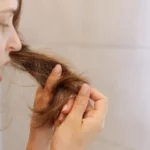Okay, let’s get one thing straight — the idea of lice crawling anywhere is already enough to make your skin crawl. But the thought of one sneaking into your ear? That’s a whole new level of “nope.” Still, it happens more often than you’d think, and while it sounds like a scene straight out of a horror movie, the truth is a little less dramatic (but still pretty gross).
Lice are clingy little creatures — they love warm, hairy environments like your scalp, where they can feed, hide, and raise a family (ew). But in rare cases, they can wander into your ear canal, especially if there’s hair nearby or you’ve been scratching around the area. When that happens, it can cause itching, irritation, and the unnerving sensation that something’s moving inside your ear — because, well, there is.
Before you panic and start Googling “how to vacuum my ear,” take a breath. Lice in the ear can be treated safely and effectively. The key is knowing what signs to look for and what not to do (spoiler: don’t shove cotton swabs in there).
Key Takeaways:
- While it’s uncommon, lice can crawl into the ear canal — especially if you already have a head lice infestation.
- Symptoms may include itching, tickling, mild pain, or the feeling of movement inside the ear.
- Don’t try to dig them out yourself; you could push them deeper or injure your ear.
- A doctor can safely remove lice and eggs using specialized tools or treatments.
- Treating your scalp and bedding is essential to prevent re-infestation.
If lice enter your ear, you may feel itching, tickling, or slight pain inside the ear canal. Though rare, it can happen during a head lice infestation when lice move toward nearby areas. Avoid inserting objects into your ear — instead, see a healthcare professional for safe removal. Treating your scalp and cleaning bedding afterward helps prevent the lice from returning.
Read Also: The Origin of Lice: Unraveling the Mystery Behind these Tiny Hitchhikers
1. Introduction to Lice Infestation:
1.1 Understanding Lice
Lice, small wingless insects, are a persistent woe known for infesting human hair and scalps. These blood-feeding parasites are not exclusive to any age group or hygiene standard, making them a common challenge in various communities. The crowded environments or close contact situations can provide an ideal breeding ground for these tiny creatures, leading to discomfort, itching, and a sense of unease.
1.2 Common Infestation Areas
While lice predominantly infest the scalp, they may occasionally be found in other body hair. Understanding their typical locations is vital for effective prevention and intervention.
2. Can Lice Go in Your Ear?
2.1 The Anatomy of the Ear
To explore the possibility of lice in the ear, we need to understand the intricate anatomy of this vital sensory organ. The unique structure of the ear may not make it the most attractive environment for lice; however, occasional cases do occur.

2.2 Likelihood of Lice in the Ear
This section delves into the factors influencing the likelihood of lice entering the ear. Factors such as hair length, personal hygiene, and environmental conditions will be discussed.
Read Also: A Comprehensive Guide to Permanently Remove Lice from Hair
3. Potential Consequences of Lice in the Ear:
3.1 Symptoms and Discomfort
Imagine the discomfort of lice in your ear—this section explores the potential symptoms such as itching, pain, or a feeling of fullness that may arise from lice infestation in this sensitive area.
3.2 Risks and Complications
Beyond discomfort, we’ll discuss the risks associated with lice potentially spreading to other body parts or causing secondary infections, emphasizing the importance of early detection and intervention.
4. Preventive Measures:
4.1 Practical Tips for Prevention
To minimize the risk of lice entering the ear, we provide practical tips such as regular hair washing, avoiding head-to-head contact, and maintaining a clean environment.
4.2 Hygiene Practices
This subsection details specific hygiene practices that can significantly reduce the chances of lice infestation, emphasizing the importance of a proactive approach.

Read Also: Preventing Lice Eggs from Hatching
5. Treatment Options:
5.1 Over-the-Counter Products
In case lice do invade the ear, this section outlines over-the-counter products designed to effectively address lice infestations.
5.2 Prescription Medications and Home Remedies
For more severe cases, we explore prescription medications and home remedies that may serve as effective treatments.
6. When to Seek Medical Attention:
6.1 Recognizing When Professional Help is Needed
While home remedies may suffice in many cases, this section guides readers on when it’s time to consult a healthcare professional, considering potential complications and serious conditions that may arise.
6.2 Complications and Serious Conditions
Detailing potential complications, this subsection stresses the importance of timely medical intervention in certain situations.

Read Also: How Long Do Lice Eggs Take to Hatch
7. Conclusion:
Ending with practical advice, this subsection provides readers with final recommendations for dealing with lice infestation in the ear and maintaining optimal ear health. Remember, early intervention is paramount in addressing lice-related concerns and preventing further complications.
FAQs: What Happens If Lice Goes in Your Ear
While it’s not common, it’s theoretically possible for lice to enter the ear, especially in cases of severe infestations or during attempts to manually remove them.
The presence of lice in the ear can lead to discomfort, itching, and, in extreme cases, potential ear infections. However, such occurrences are rare.
Extreme cases of severe infestations and secondary infections may cause temporary hearing disturbances, but this is highly uncommon.
Lice typically have claws designed to cling to hair strands, making it challenging for them to voluntarily enter the ear. Entry can occur accidentally, especially during attempts to remove lice.
Maintain good hygiene, avoid sharing personal items like combs and headphones, and seek early detection and treatment for lice infestations to prevent them from reaching the ears.
Consult a healthcare professional for a proper examination. They can provide guidance on treatment and address any potential complications like infections.
While extreme cases may cause temporary hearing disturbances, permanent hearing loss due to lice in the ear is extremely rare.
Lice are specialized for living in specific areas, and their movement is limited. The likelihood of lice traveling from the ear to other parts of the body is minimal.
It’s recommended to seek professional advice for the proper treatment of lice, especially if they are suspected in the ear, to prevent potential complications.
The onset of symptoms such as itching and discomfort can vary. Prompt action is advisable if you suspect lice infestation to prevent complications.



GIPHY App Key not set. Please check settings
One Comment